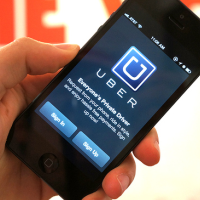Blind Passengers Can Sue Uber over Bias and Treatment of Their Dogs

Uber, the quasi-taxi service that fancies itself a mobile app developer operating under an innovative business model in the sharing economy, will have to face accusations in federal court that it discriminates against the blind.
U.S. Magistrate Nathanael Cousins in San Francisco ruled this week that a lawsuit brought against the San Francisco-based start-up last September by the National Federation of the Blind in California can go forward. The suit alleges that “UberX drivers are refusing to transport many blind individuals who use service animals.”
Uber argued that it wasn’t a public accommodation (like, say, a taxi service) under the Americans With Disabilities Act and that the plaintiffs didn’t have a plausible claim. Cousins disagreed, said Uber was a “travel service” and denied its motion to dismiss the case on all grounds.
The plaintiffs claimed to be aware of at least 30 instances of discrimination and abuse. The lawsuit cited instances of Uber charging blind passengers a cancellation fee after drivers refused to accommodate their guide dogs. The fees were refunded after the passengers complained in writing. One blind woman was allegedly denied a ride 12 times and others were abandoned in inclement weather when the driver saw their dogs.
In one instance, an Uber driver allegedly locked a dog in the trunk. When the blind woman, already in the moving vehicle, realized what the driver had done, she demanded he pull over. She said he did not.
Federal law frowns on that sort of behavior by transportation services.
The U.S. Department of Justice (DOJ) entered a “statement of interest” (pdf) in the case, making the argument that it didn’t really matter if Uber fit the technical definition of a public accommodation. It was still providing transportation services that fall under other federal laws that say you can’t discriminate against blind people.
The $40-billion behemoth continues to make the argument on an international stage that it is something else. Uber operates in hundreds of cities in 56 countries, where it is embroiled in competition with entrenched interests and often at odds with regulatory authorities who regard safety, insurance, fair employee compensation, taxes and nondiscriminatory behavior as more than quaint reminders of a bygone era.
Los Angeles County and San Francisco filed a civil lawsuit through the state against Uber in December alleging “unlawful business practices,” and 19 California taxi companies sued the company in March for allegedly misrepresenting the safety of their rides.
Uber has clashed repeatedly with the California Public Utilities Commission (PUC), the Department of Motor Vehicles (DMV) and local governments over a range of issues. It has until May 4 to respond to the lawsuit.
–Ken Broder
To Learn More:
Blind Users with Service Animals: Uber Refuses to Serve Us (by Cyrus Farivar, Ars Technica)
Uber Must Face Lawsuit Claiming Bias Against Blind Riders (by Jonathan Stempel, Reuters)
Blind People's Suit Against Uber Advances (by Arvin Temkar, Courthouse News Service)
Uber Must Face Charges It Discriminates Against Blind Passengers (by Martyn Williams, IDG News Service)
Judge Rules That Blind Passengers Can Sue Uber for Discrimination (by Bob Egelko, San Francisco Chronicle)
S.F. and L.A. Engage in the International Pastime of Suing Uber (by Ken Broder, AllGov California)
- Top Stories
- Controversies
- Where is the Money Going?
- California and the Nation
- Appointments and Resignations
- Unusual News
- Latest News
- California Forbids U.S. Immigration Agents from Pretending to be Police
- California Lawmakers Urged to Strip “Self-Dealing” Tax Board of Its Duties
- Big Oil’s Grip on California
- Santa Cruz Police See Homeland Security Betrayal in Use of Gang Roundup as Cover for Immigration Raid
- Oil Companies Face Deadline to Stop Polluting California Groundwater





